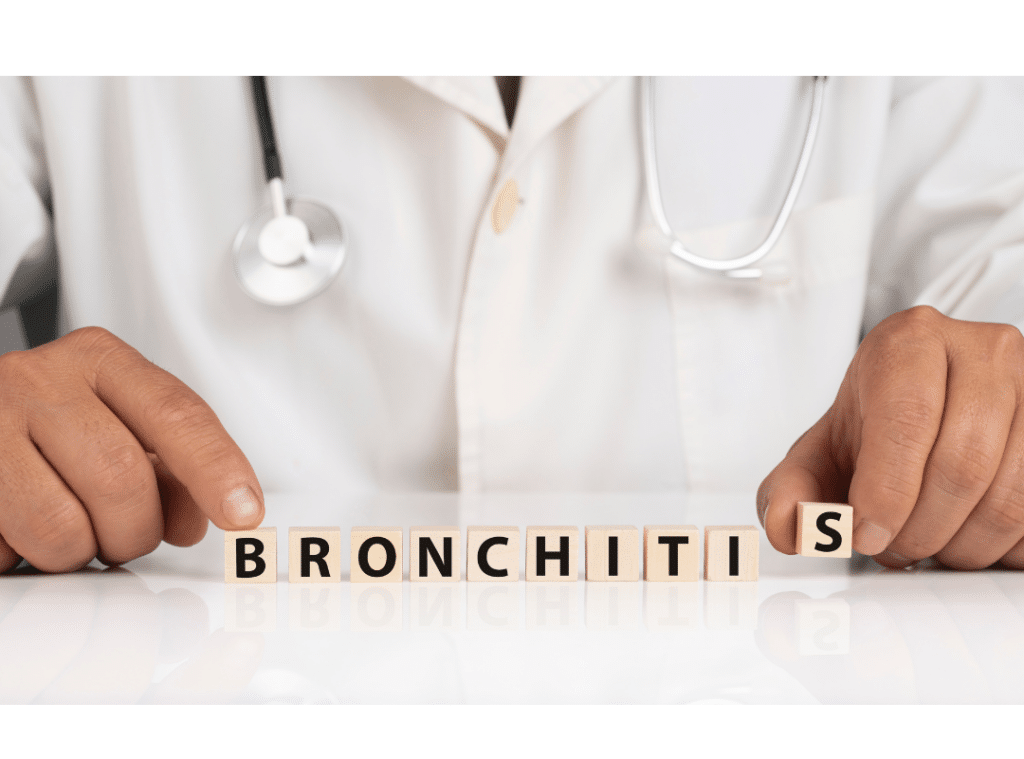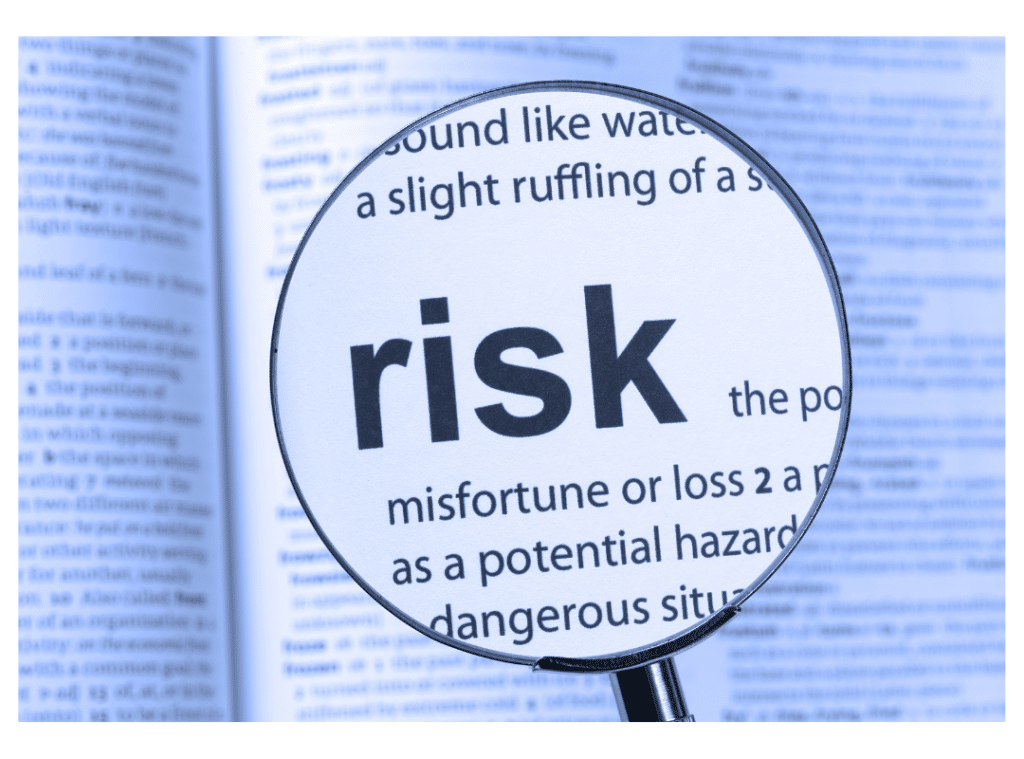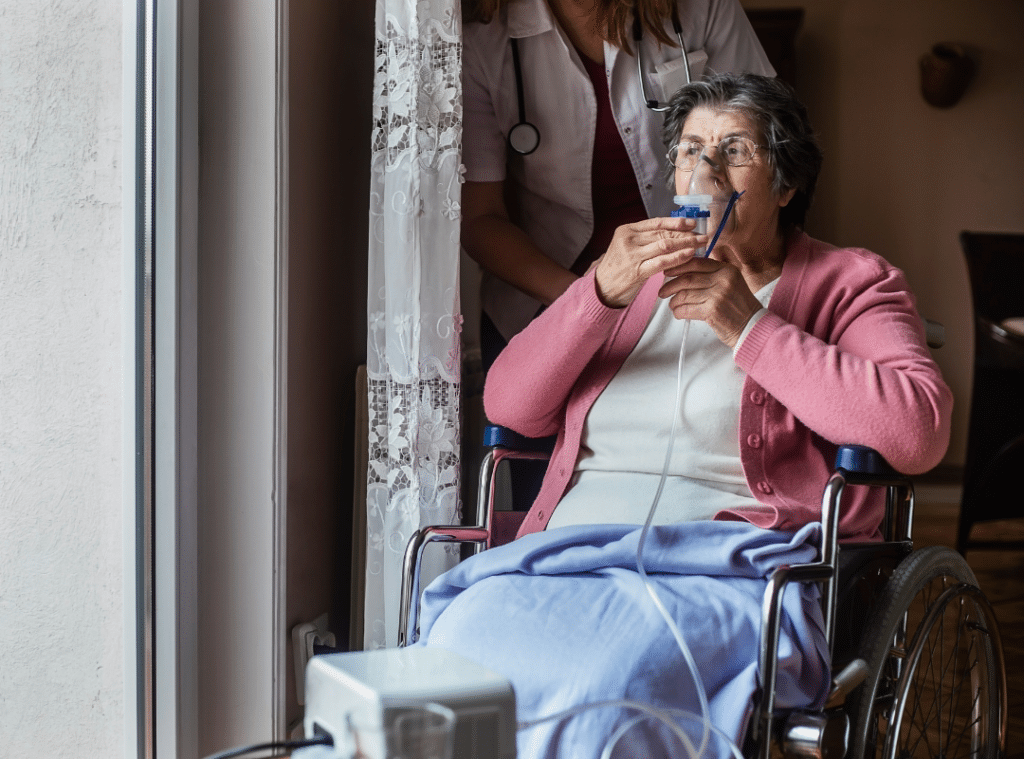Bronchitis in the Elderly: Signs, Risks, and When to Seek Help
Imagine bronchitis in the elderly as a subtle intruder, gradually tightening its grip on the unsuspecting. You may notice your loved one’s persistent cough lingering longer than usual, a hint of wheezing, or a weariness that doesn’t fade with rest. These signs could be the initial whispers of a more significant concern. But how do you decipher when bronchitis transforms into a more serious threat? Understanding the nuances of this respiratory condition in the elderly is vital for timely intervention and improved outcomes at The Oaks at Nipomo.

Overview of Bronchitis in Elderly
If you’re an elderly individual experiencing persistent coughing and shortness of breath, you may be dealing with bronchitis. Diagnosis challenges often arise in elderly patients due to overlapping symptoms with other conditions like pneumonia or chronic obstructive pulmonary disease. Healthcare providers need to conduct thorough evaluations, including physical exams, chest X-rays, and sputum tests, to accurately diagnose bronchitis in the elderly. Understanding the impact of bronchitis on lung function in seniors can guide appropriate care and treatment strategies for optimal recovery.
Common Signs and Symptoms
Elderly individuals with bronchitis often exhibit a range of common signs and symptoms that can indicate the presence of this respiratory condition. Some of these include persistent coughing, often producing green or yellow mucus, wheezing, shortness of breath, chest discomfort, fatigue, and mild fever. Diagnostic tests such as chest X-rays, sputum tests, and pulmonary function tests can help confirm the diagnosis of bronchitis in the elderly. Addressing these symptoms promptly is crucial for preventing falls in elderly individuals with bronchitis.
When it comes to treatment options, healthcare providers may recommend rest, plenty of fluids, and over-the-counter medications to help manage symptoms like pain and fever. In cases where bronchitis is caused by a bacterial infection, antibiotics may be prescribed. Additionally, inhalers or nebulizers can be used to help open the airways and ease breathing difficulties.
Elderly individuals with bronchitis need to follow their healthcare provider’s recommendations closely to guarantee proper management and recovery from this respiratory condition.

Complications and Risks
When it comes to bronchitis in the elderly, it’s vital to be aware of potential complications that can arise from the condition.
Older individuals are at a higher risk due to weakened immune systems and underlying health issues.
If you experience severe symptoms or have trouble breathing, seeking prompt medical attention is essential to prevent any further complications.
Potential Complications Overview
Bronchitis in the elderly can lead to a range of potential complications and risks that shouldn’t be ignored. When managing bronchitis in older individuals, it’s important to explore the treatment options available to alleviate symptoms and prevent further complications. Antibiotics may be necessary for bacterial infections, while inhalers can help with breathing difficulties. It’s crucial to adhere to the prescribed treatment plan diligently to ensure the best possible outcome.
Moreover, bronchitis can have lasting effects on the elderly, especially if left untreated or if the individual has underlying health conditions. Chronic bronchitis, a form of COPD, can develop over time, leading to persistent cough, shortness of breath, and reduced lung function. This underscores the significance of seeking medical attention promptly and following through with the recommended treatment to minimize the risk of long-term complications.
Risks for Elderly
With bronchitis in older individuals, the potential complications and risks can be significant. Preventive measures play an essential role in mitigating these risks. Elderly individuals with bronchitis are at a higher risk of developing serious health implications, such as pneumonia, especially if they’ve underlying conditions like COPD or heart disease. The weakened immune system in the elderly makes them more susceptible to complications from bronchitis.
Health implications of bronchitis in the elderly can include exacerbation of existing respiratory conditions, difficulty breathing, and increased vulnerability to respiratory infections. Preventive measures like annual flu vaccinations and practicing good hand hygiene can help reduce the risk of bronchitis and its complications in older individuals.
It’s important for caregivers and healthcare providers to closely monitor elderly patients with bronchitis to promptly address any deterioration in their condition. Being proactive in managing bronchitis in the elderly can help prevent further health complications and improve overall well-being.
Seeking Medical Attention
Experiencing persistent coughing, wheezing, or shortness of breath could indicate potential complications from bronchitis in the elderly. Early intervention is important in managing these symptoms to prevent the condition from worsening.
If you notice that your loved one is struggling to breathe, seems confused, or has bluish lips or fingernails, seek medical attention immediately. Timely treatment can help prevent severe complications such as pneumonia, respiratory failure, or exacerbation of underlying conditions like COPD or heart disease.
When seeking medical help, provide the healthcare provider with a detailed account of the symptoms, including when they started and how they’ve progressed. Be prepared to discuss any pre-existing conditions or medications the elderly individual is taking.
Follow the doctor’s recommendations diligently and make sure that any prescribed medications are taken as directed. Remember, prompt medical attention is vital in managing bronchitis in the elderly and reducing the risk of serious complications.
Discover the level of care you or your family member requires. What Level of Care Do You Need?
Differences From Bronchitis in Younger Adults
As you age, the symptoms of bronchitis may vary compared to when you were younger, often presenting with more pronounced coughing and breathing difficulties. Additionally, the risk of complications such as pneumonia increases in elderly individuals with bronchitis, requiring careful management and monitoring. Understanding these age-related differences is essential in providing effective treatment and support for older adults with bronchitis. Moreover, lifestyle factors like smoking history can also impact the severity and duration of bronchitis symptoms in the elderly.
Age-Related Symptoms Variations
Elderly individuals with bronchitis often present with a distinct set of symptoms that differ from those seen in younger adults. In the elderly, symptom progression tends to be slower, and the initial signs might be subtle, such as fatigue, mild cough, or slight shortness of breath. As bronchitis develops, older adults may experience more severe coughing fits, increased mucus production, and a higher risk of developing complications like pneumonia.
Age-related treatment for bronchitis in the elderly focuses on managing symptoms and preventing further complications. Healthcare providers often recommend rest, hydration, and over-the-counter medications to alleviate cough and fever.
However, due to the aging immune system and potential comorbidities, antibiotics are more frequently prescribed in this age group to combat bacterial infections that can exacerbate bronchitis. Additionally, seniors may benefit from pulmonary rehabilitation programs to improve lung function and reduce the risk of recurrent bronchitis episodes.
Seeking prompt medical attention is essential for elderly individuals with bronchitis to receive appropriate care and prevent complications.
Complications and Management
Symptoms of bronchitis in older adults can lead to various complications that differ from those observed in younger individuals. Older adults with bronchitis are more prone to developing long-term effects such as chronic bronchitis, recurrent respiratory infections, and even pneumonia. Due to age-related changes in the immune system and lung function, these complications can be more severe and have a higher risk of leading to hospitalization.
When it comes to managing bronchitis in the elderly, treatment options focus on alleviating symptoms, preventing complications, and improving overall respiratory health. This may include rest, staying hydrated, using humidifiers to ease breathing, and in some cases, prescribed medications like bronchodilators or steroids to reduce inflammation in the airways.
Seniors with bronchitis need to follow their healthcare provider’s recommendations closely to avoid exacerbating the condition or developing further complications. Regular follow-up visits and monitoring are essential to guarantee proper management and recovery from bronchitis in older adults.
Treatment Options for Seniors
When considering treatment options for seniors with bronchitis, it’s vital to focus on alleviating symptoms and promoting recovery efficiently. For medication options, doctors may prescribe bronchodilators to help open airways, antibiotics if a bacterial infection is present, or cough suppressants to manage persistent coughing. These medications aim to reduce inflammation, fight infection, and ease discomfort. It’s important to follow the prescribed dosage and complete the full course of medication.
In addition to medications, home remedies can also play a significant role in managing bronchitis in seniors. Encourage plenty of rest to allow the body to heal, maintain hydration by drinking fluids like water or warm herbal teas, and use a humidifier to keep the air moist and soothe irritated airways. Warm compresses on the chest can help relieve discomfort, and breathing exercises may improve lung function. These home remedies can complement medical treatment and support the senior’s recovery process effectively. Outdoor games for seniors offer physical health benefits such as improved mobility and cardiovascular health.

When to Consult a Healthcare Provider
If you or a loved one are experiencing persistent or worsening bronchitis symptoms, it’s important to seek guidance from a healthcare provider promptly. While home remedies and natural remedies may offer some relief, consulting a healthcare professional is essential for the proper evaluation and management of bronchitis in the elderly. Home remedies like staying well-hydrated, using a humidifier, and getting plenty of rest can help alleviate symptoms, but they may not address the underlying cause or prevent potential complications. Natural remedies such as herbal teas, steam inhalation, and essential oils may also provide some relief from bronchitis symptoms, but they should complement medical advice rather than replace it.
A healthcare provider can assess the severity of the bronchitis, determine if any medications are necessary, and monitor for any complications that may arise. They can also provide guidance on when to contemplate more aggressive treatments or hospitalization if needed. Seeking professional medical advice guarantees that elderly individuals receive appropriate care tailored to their specific needs and helps prevent the progression of bronchitis into a more serious condition. Age-related physiological changes, such as immunosenescence, weaken the immune response, making the elderly more vulnerable to severe outcomes from bronchitis.

Prevention Strategies for the Elderly
To effectively prevent bronchitis in the elderly, it’s necessary to focus on implementing various strategies that can help reduce the risk of developing this respiratory condition. Lifestyle modifications play a pivotal role in preventing bronchitis.
Encourage regular exercise to enhance lung function and strengthen the immune system. Avoiding exposure to tobacco smoke and other pollutants is also crucial. Proper hand hygiene, especially during cold and flu seasons, can help prevent the spread of respiratory infections.
Additionally, vaccination plays a noteworthy role in bronchitis prevention for the elderly. Getting an annual flu vaccine is essential, as the flu can lead to bronchitis in vulnerable populations. Pneumococcal vaccines are also recommended to protect against pneumonia, a common complication of bronchitis.
Lastly, maintaining a healthy diet rich in fruits, vegetables, and whole grains can help support overall immune function. Adequate hydration is vital to keep the respiratory tract moist and prevent infections. By incorporating these lifestyle modifications and emphasizing the importance of vaccinations, the risk of bronchitis in the elderly can be greatly reduced.
As an older adult, you may experience bronchitis differently than younger individuals. Remember, seeking medical attention promptly can make all the difference in your recovery. So, if you notice symptoms worsening or breathing becoming difficult, don’t hesitate to reach out to a healthcare provider at The Oaks at Nipomo by calling (805) 723-5206. Stay informed, stay proactive, and stay healthy – your well-being is worth it.








